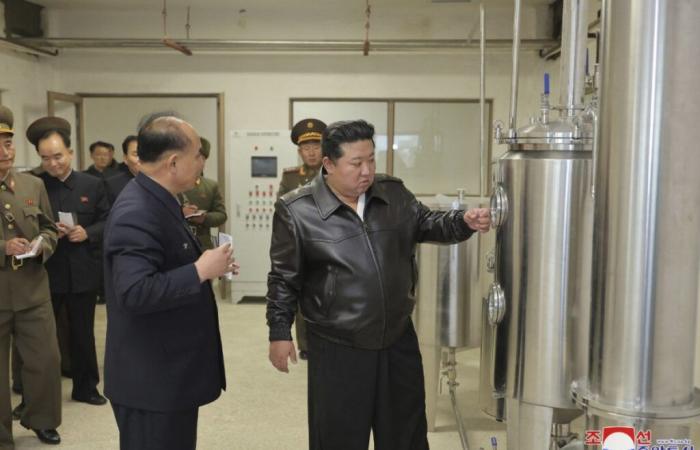
North Korean leader Kim Jong Un attended a performance test of explosive drones at a factory on Thursday (November 14), according to the North Korean news agency KCNA. (KCNA VIA KNS/STR)
In June, Russia concluded a mutual defense treaty with North Korea, which provides for reciprocal “immediate military assistance” in the event of an attack against either country.
Devices that could come from the strengthening of North Korea's alliance with Russia. North Korean leader Kim Jong Un ordered
give priority to the “mass production” of explosive drones,
state media reported this Friday, November 15, at a time when his country is accused of sending soldiers and weapons to Russia to help it in its war against Ukraine.
Kim Jong Un attended the
a performance test
of this type of machine in a factory, according to the North Korean news agency KCNA. “He stressed the need to build a mass production system
as soon as possible and move to mass production.”
of explosive drones, reported KCNA. These explosive-carrying drones, which Pyongyang first unveiled in August, are designed to deliberately crash into enemy targets, acting as
guided missiles.
Experts believe that these drones may come from
strengthening the country's alliance with Russia.
Moscow and Pyongyang, communist allies throughout the Cold War, have
considerably close together
since the start of the Russian attack on Ukraine in February 2022. Russia notably concluded a
mutual defense treaty
with North Korea during a rare visit by its President Vladimir Putin to Pyongyang in June, which provides for reciprocal “immediate military aid” in the event of an attack against one of the two countries.
Technologies that may have been acquired from Russia
In Thursday's test, the drones “precisely” hit targets after following predetermined trajectories, KCNA reported. “Suicide attack drones used at different striking distances have the mission
to precisely attack all enemy targets on the ground and at sea”,
the agency said. Kim Jong Un said drones were an “easy item to use” because of their
relatively low production cost and their wide range of applications,
according to KCNA.
He argued that North Korea had “recently
attached to the importance”
to the development of unmanned military equipment and their integration into the country's overall military strategy. Experts have estimated that these drones, images of which were published by state media in August,
resemble the Russian-made Lancet-3,
as well as the explosive drone
Israeli-made Harop and the also Israeli Hero-30.
According to specialists, North Korea could have
acquired these technologies from Russia
which, in turn, probably obtained them from Iran, Tehran itself being suspected of having had access to them by hacking or stealing them from Israel.
These drones “could also be used” in the war in Ukraine, according to an expert
This announcement also comes in a
period of tensions between South Korea and North Korea,
which recently fired a new solid-fuel intercontinental ballistic missile, presented by the North Korean regime as the most advanced in its arsenal. In 2022, North Korea sent drones to the South, five of which managed to cross the border, leading the South Korean military to carry out warning shots and deploy fighter jets. The latter had not managed to shoot down a single drone.
This year, in addition to sending balloons filled with garbage towards the South, Pyongyang accused Seoul of
violate one's sovereignty
by deploying drones to drop propaganda. By mentioning the “production and practical deployment of various drones,” North Korea appears to be implying that it could do the same, Yang Moo-jin, president of the University of North Korea Studies, told AFP. Koreans from Seoul. Pyongyang could “suggest the possibility
to use balloons to disseminate leaflets in the South
with such drones,” continued Yang Moo-jin.
“Given the effectiveness of drone attacks seen in the Ukraine war, they could also
be used” in the context of this conflict,
he added. Last month, North Korea amended its constitution to define
South Korea as a “hostile” state,
and demolished roads and railways connecting the two countries.





